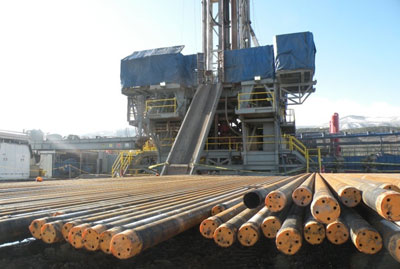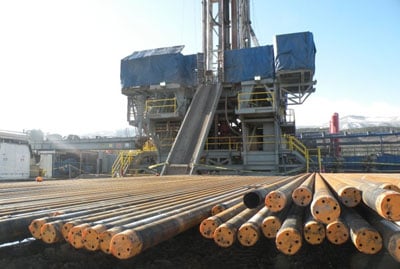
Support Truthout’s work by making a tax-deductible donation: click here to contribute.
 Sections of drilling pipe and a drilling rig on a six-well pad in the Piceance Basin of Colorado. (Photo: Ecopolitologist) Colorado is facing drought not seen since 2002, following the fourth-warmest and third-least-snowy winter in US history. Colorado State University scientists report that 98 percent of the state is facing these drought conditions.
Sections of drilling pipe and a drilling rig on a six-well pad in the Piceance Basin of Colorado. (Photo: Ecopolitologist) Colorado is facing drought not seen since 2002, following the fourth-warmest and third-least-snowy winter in US history. Colorado State University scientists report that 98 percent of the state is facing these drought conditions.
The drought comes after a record-breaking warm winter that left very low “snowpack levels” in water basins. “Even though the reservoir levels are still strong and northeast Colorado soil moisture is still pretty good, we just don’t usually start out quite this warm and dry at this time — so this is very concerning,” CSU climatologist Nolan Doesken said. “In 2002, things didn’t seem that bad at the end of March, as March had been quite cool, with some snow.”
Colorado’s hydrofracking boom — a technology that heavily relies on water — only adds additional strain as farmers and drillers bid for a scarce resource:
At Colorado’s premier auction for unallocated water this spring, companies that provide water for hydraulic fracturing at well sites were top bidders on supplies once claimed exclusively by farmers. […]
State officials charged with promoting and regulating the energy industry estimated that fracking required about 13,900 acre-feet in 2010. That’s a small share of the total water consumed in Colorado, about 0.08 percent. However, this fast-growing share already exceeds the amount that the ski industry draws from mountain rivers for making artificial snow. Each oil or gas well drilled requires 500,000 to 5 million gallons of water.
A Colorado Oil and Gas Conservation Commission report projected water needs for fracking will increase to 18,700 acre-feet a year by 2015.
Farmers who go to the auctions seeking to produce food — or maybe plant more acres — are on equal footing with companies seeking water for fracking, Northern Water spokesman Brian Werner said.
“If you have a beneficial use for the water, then you can bid for that water,” Werner said. “We see the beneficial use of the water as a positive for the economy of the whole region. Fracking is one of those uses. Our uses of water have evolved over 150 years.”
States including Colorado, Alabama, Florida, and Virginia have all faced raging wildfires before wildfire season even officially sets off, fueled by the winter that wasn’t and the March madness powered by global warming pollution from fossil-fuel polluters like Colorado’s frackers.
Our most important fundraising appeal of the year
December is the most critical time of year for Truthout, because our nonprofit news is funded almost entirely by individual donations from readers like you. So before you navigate away, we ask that you take just a second to support Truthout with a tax-deductible donation.
This year is a little different. We are up against a far-reaching, wide-scale attack on press freedom coming from the Trump administration. 2025 was a year of frightening censorship, news industry corporate consolidation, and worsening financial conditions for progressive nonprofits across the board.
We can only resist Trump’s agenda by cultivating a strong base of support. The right-wing mediasphere is funded comfortably by billionaire owners and venture capitalist philanthropists. At Truthout, we have you.
We’ve set an ambitious target for our year-end campaign — a goal of $250,000 to keep up our fight against authoritarianism in 2026. Please take a meaningful action in this fight: make a one-time or monthly donation to Truthout before December 31. If you have the means, please dig deep.